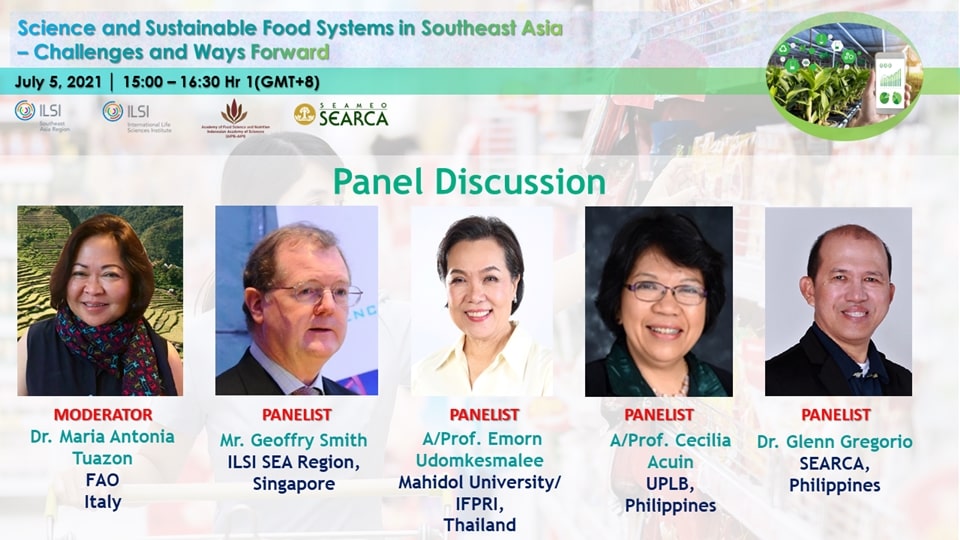
The International Life Sciences Institute (ILSI), the ILSI Southeast Asia Region (ILSI SEA Region), the Academy of Food and Nutrition-Indonesia Academy of Sciences (AIPG-AIPI), and the Southeast Asian Regional Center for Graduate Study and Research in Agriculture (SEARCA), organized a webinar entitled, “Science and Sustainable Food Systems in Southeast Asia – Challenges and Ways Forward” on 5 July 2021 via Zoom.
In conjunction with the United Nations Food Systems Summit (UNFSS) Science Days, the side event aims to present some of the challenges and opportunities towards sustainable agricultural productivity and host a panel discussion on steps for progress.
Chaired by Dr. Maria Antonia V. Guillermo-Tuazon, Nutrition and Food Systems Officer of the Food and Agriculture Organization of the United Nations (FAO), the webinar invited three speakers to give an overview of science and sustainable food systems in Southeast Asia.
Professor Paul S. Teng of Nanyang Technological University, Singapore’s presentation is about the sustainability of ASEAN food supply and system resilience. He reported that in order to make transformation happen, there should be increased investment in research and development (R&D) and entrepreneurship to stimulate more regenerative agricultural production and improve rural livelihoods among others.
Meanwhile, Professor Brajesh Singh of Western Sydney University, Australia, led a discussion on microbiomes, ecosystem functions, and sustainable agriculture. Among the key takeaways, Prof. Singh enumerated future products following the concept of effective microbiome tools that include: (1) SynCom, an effective pro- and synbiotics; (2) in situ microbiome engineering or new tools to increase activity of beneficial crop microbes in situ; and (3) microbiome or genome optimized new plant varieties with higher productivity with less chemical inputs.
Aligned with the report of Prof. Teng on sustainability, he proposed solutions to mitigate product and food safety, public perception, and regulatory risks. System-based approach and a well-coordinated global approach for improved outcomes were among the points reported by the ecologist.
Lastly, Mr. Adhi Lukman of the Indonesian Food and Beverages Association (GAPMMI), Indonesia, talked about the roles of small and medium-sized enterprises (SMEs) in food system transformation in developing economies. He focused his presentation on how to achieve healthier diets and how to encourage public consumption of nutritious and affordable foods.
The side event also solicited perspectives from various experts in agri-food systems and nutrition. In the group of the panelists, Dr. Glenn B. Gregorio, SEARCA Director and 2021 UN Food Systems Champion, spoke about leveraging on the field of sciences in order to help transform the food system in terms of food production and supply.
“We must focus in seed systems since this is very vital in ensuring our food system. Seed development or varietal development require a lot of science. From genetics to seed technology and packaging, to good crop management practices, all of these things are important to make the system sustainable,” Dr. Gregorio said.
The SEARCA Director also mentioned that consumer behavior will dictate the production strategy of today. He foresees consumers of the food value chain to be the gamechangers in the agri-food system.
He added that “another gamechanger in terms of scientific breakthroughs or innovations that will pave the way for food system transformation is the farm clustering via digital agriculture. Financial technology is now very relevant since it is a technology that delivers financial service from online banking to farm loans and transactions.”
Dr. Gregorio summed up his discussion by reinforcing the need for more science and policy integration. He also stressed the need to understand the roles of the public and private sectors.
“We need to strengthen the policy enabling framework on this matter. While we see the government as an enabler, we also need to understand when and how the private sector should enter into the picture. The public sector must have the mindset that the government is just a facilitator and understand that the private sector is the very vital component in our food system to make it sustainable,” the Director said.